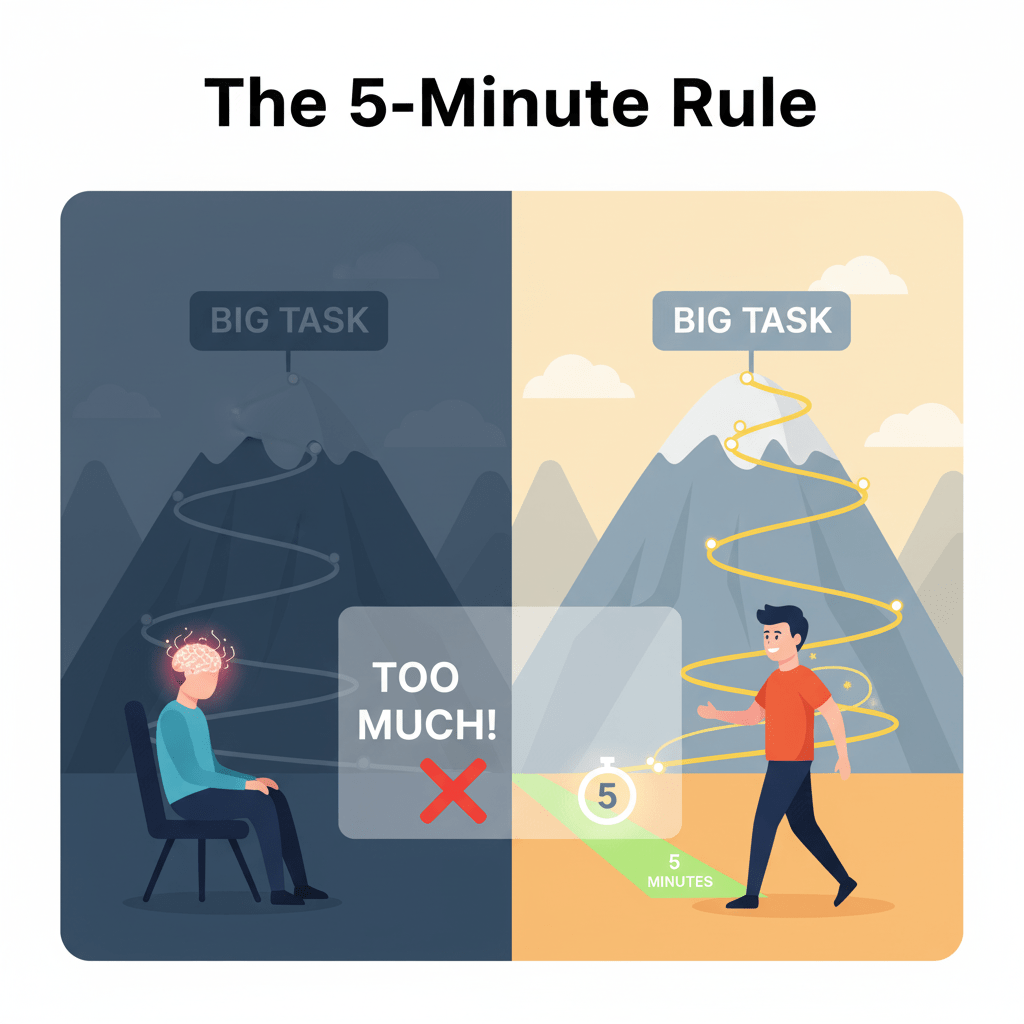We’ve all been there. You have a goal maybe it’s to start exercising, learn a new language, or finally organize that closet. The motivation is there, but the moment you face the task, a wall of resistance goes up. Your brain says, “That’s too much work. Let’s just watch another episode.” This feeling of overwhelm is the number one reason why good intentions fail. The good news? You can trick or hack your brain. The solution is simple, effective, and requires just five minutes of your time. Welcome to the 5-Minute Rule.
What Exactly Is the 5-Minute Rule?
The 5-Minute Rule is a psychological hack that helps you overcome procrastination and resistance. It works on a single, powerful principle: promise yourself you only have to do the task for five minutes. That’s it.
- Want to start a new workout routine? Just put on your gym clothes and do five minutes of stretching.
- Need to learn to code? Open your coding program and write five minutes of code.
- Want to meditate? Sit down, set a timer, and meditate for five minutes.
The key is that the commitment is tiny. It’s so small that your brain can’t find a reason to say no. It’s an almost effortless step, and this initial momentum is often all you need to get going.
The Psychology Behind Why It Works
The 5-Minute Rule isn’t just a feel-good trick; it’s rooted in how our brains work.
- Overcoming Activation Energy: In physics, “activation energy” is the minimum energy required to start a chemical reaction. Our brains have a similar concept. The hardest part of any task is often just starting it. The 5-Minute Rule lowers this activation energy to almost zero, making the barrier to entry non-existent.
- The Zeigarnik Effect: This is a well-known psychological phenomenon that states our brains hate unfinished tasks. Once you start something even for just five minutes your mind will want to finish it. You’ve created an open loop in your brain that it will feel a compelling need to close. It’s what makes you want to finish that TV show or video game.
- Building Momentum: Five minutes of work often leads to ten, which can lead to fifteen, and so on. Once you’re in the flow, it’s much easier to keep going than it was to start. You’ll often find that once your five minutes are up, you don’t want to stop.
How to Implement the 5-Minute Rule in Your Life
Ready to put this simple hack to work? Follow these steps:
- Identify Your Habit: Pick one new habit you want to start. Be specific. Instead of “I will be more productive,” choose “I will write for 30 minutes every morning.”
- Break It Down to 5 Minutes: Now, shrink that habit down to a five-minute action. For our example, “I will write for 30 minutes” becomes “I will write for 5 minutes.”
- Set a Timer: This is a crucial step. The timer makes the commitment concrete and prevents you from feeling overwhelmed. Set a timer on your phone, a watch, or your computer for five minutes.
- Promise Yourself You Can Stop: This is the most important part of the rule. You must genuinely believe that when the timer goes off, you are free to stop. No guilt, no pressure. You have fulfilled your promise.
- Rejoice in Your Progress: No matter what happens, celebrate your five minutes. Even if you don’t continue, you still showed up. You reinforced the positive habit of starting, which is a massive victory in itself.
When the 5-Minute Rule Is a Game-Changer
- Tackling a big project: Feeling overwhelmed by a huge report or a major home renovation? Commit to working on it for just five minutes a day. The progress will build up over time.
- Starting a fitness routine: Don’t promise yourself a one-hour workout. Just promise yourself five minutes of stretching or walking. You’ll likely do more, but even if you don’t, you’ve kept the habit alive.
- Building a daily reading habit: Instead of “I will read a chapter a day,” start with, “I will read for five minutes.”
The 5-Minute Rule is your secret weapon against the all-or-nothing mindset. It’s not about being perfect; it’s about being consistent. By repeatedly showing up for just five minutes, you’re not just completing a task you’re training your brain to see that “hard thing” as something manageable. You’re building the habit of starting, and that is the first and most critical step toward any lasting change.


